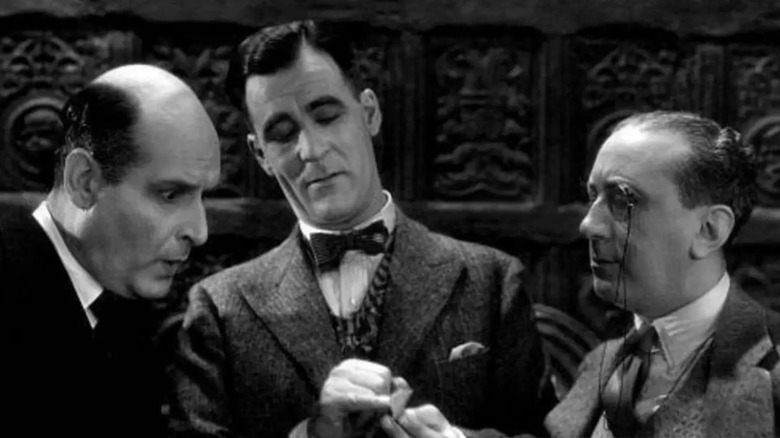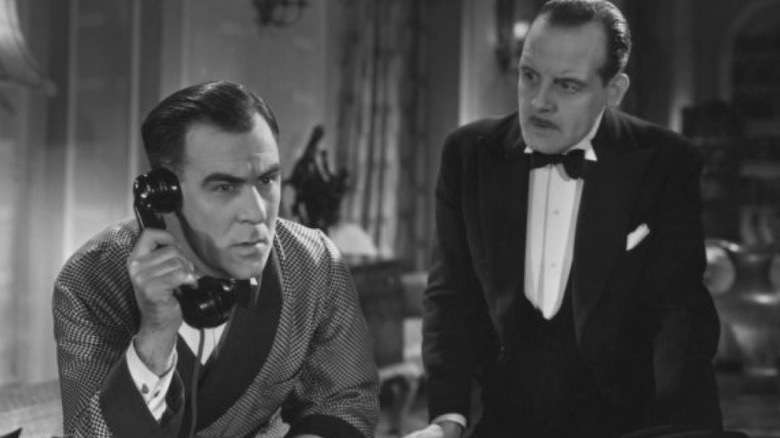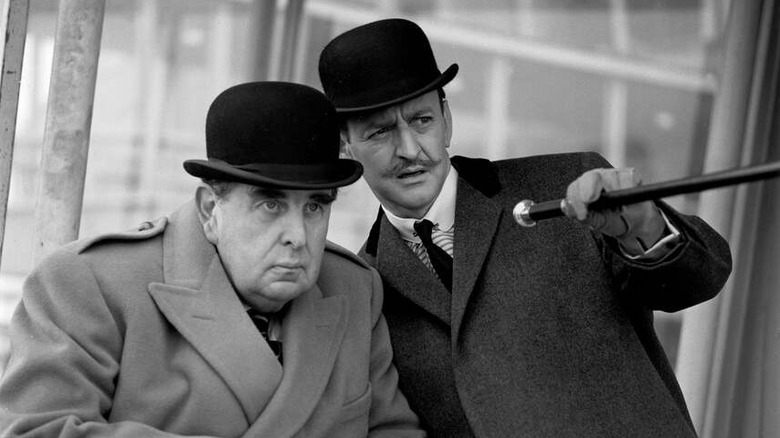The First Hercule Poirot Movie Is Impossible To Watch Today
We may receive a commission on purchases made from links.
Agatha Christie in on record speaking about how much she tended to dislike film and TV adaptations of her own work. Generally speaking, she hated the tendency filmmakers had toward making her murder mysteries into whimsical, comedic farces. Christie had some especially harsh words for actress Margaret Rutherford, who played a slapstick version of Miss Marple in three Christie-based films in the 1960s. The author was even barred (by her friends) from watching certain adaptations, as they would most certainly have elicited months of complaints. This is one of the main reasons actor David Suchet took the role of Hercule Poirot so seriously for the celebrated BBC series "Agatha Christie's Poirot" from 1989.
Of course, Christie's murder mysteries were so naturally cinematic, that filmmakers were drawn to them repeatedly during the author's decades-long writing career. The very first film adaptation of an Agatha Christie story was Leslie H. Hiscott's and Julius Hagen's "The Passing of Mr. Quin" from 1928, released only eight years after Christie's first story was published. As of this writing, there have been over 50 film adaptation of Christie's stories and plays
The first film to feature Christie's stalwart and fastidious Belgian detective Hercule Poirot was Hiscott's 1931 film "Alibi." "Alibi" was the first of three Poirot mysteries put out by the long-lived British company Twickenham Film Studios, as it was followed by "Black Coffee" that same year, and rounded out by "Lord Edgware Dies" in 1934. All three films starred Irish actor Austin Trevor as Poirot, and Trevor claimed (in Mark Aldridge's book "Agatha Christie on Screen") that he secured the coveted role merely because he could do a French accent. Sadly, of those three, only the latter survives. The first two have been lost to history.
The lost films of Hercule Poirot
"Alibi" was actually an adaptation of an adaptation of Christie's work. Yes, that kind of cinematic self-reflexivity was already happening by 1931. The film's screenplay by H. Fowler Mear was extrapolated from the Michael Morton's popular 1928 play "Alibi," which was, in turn, based on Christie's 1926 novel "The Murder of Roger Ackroyd," her third Poirot story. The plot involved a man who was secretly engaged to a potential murderess, accused of poisoning her first husband. There are a lot of secret affairs and skeletons in the closet, natch. When Ackroyd is murdered, Poirot is called in to investigate. Was it the clearly guilty Ralph Ackroyd, or someone unexpected?
Franklin Dyall played the Roger Ackroyd in the film version of "Alibi," while Ronald Ward played Ralph. The film also starred Mary Jerrold and Elizabeth Allan. Trevor, perhaps surprisingly, does not sport Poirot's signature mustache, and tooled around in tweed coats and a hefty lacquering of pomade. Although he was playing a Belgian character, Trevor still looked like a bloke of the Isles. These estimations, though, are made only from production stills and screen-captures. The film itself is gone forever, its physical film stock having rotted away. Perhaps a print exists somewhere, but no one knows where. The same is true of "Black Coffee," Trevor's and Hiscott's follow-up film. No one can comment on Trevor's performances in these films because they don't exist anymore.
Also, according to Mark Aldrige's website, even the scripts are missing from these films, so we can't even comment on their stories or dialogue. Aldridge noted, however, that "Lord Edgware Dies," the surviving 1934 Poirot film, is stodgy and boring. He even thinks that Trevor looks uncomfortable in the role, and that the film, in his words, lacks atmosphere. This leads Aldridge to believe that "Alibi" probably also sucks.
When Trevor returned to the world of Agatha Christie
Trevor wasn't wholly done with Agatha Christie after 1934, however. In 1948, Trevor played Poirot again in a noted radio adaptation of "Peril at End House." Like "Alibi," however, it was adapted from a 1940 play — this one by Arnold Ridley — and was not based directly on Christie's original novel. The radio play also starred an actor named Ian Fleming, but don't get too excited. This was a different Ian Fleming than the author who created James Bond. The radio play, while relatively obscure, was still seemingly better received than the Trevor/Twickenham films. Sadly, it too seems to be difficult to find.
That was the last time Trevor played Poirot, but returned to play a character named Judson in the 1965 Christie adaptation "The Alphabet Murders." That film started Tony Randel as Poirot, and was directed by Frank Tashlin, best known for his work in animation; he was one of the star writers and directors behind the Looney Tunes. As one might guess, "The Alphabet Murders" is bright, brisk, and silly, just the way Agatha Christie hated.
These days, Poirot lives on in a series of high-profile feature films directed by and starring Kenneth Branagh. To date, he has adapted "Murder on the Orient Express" (which was excellent), "Death on the Nile" (which was abysmal), and "A Haunting in Venice" (which was pretty good). Branagh has said that he intends to play Poirot again, although his next intended film will be called "The Last Disturbance of Madeline Hynde," and it is not based on a book by Agatha Christie. He'll get back to Poirot eventually, I'm sure.


